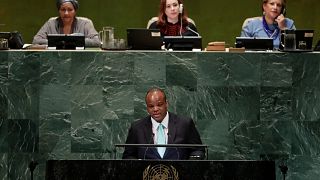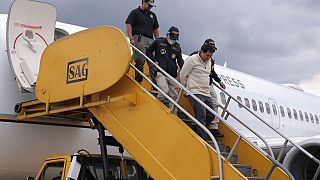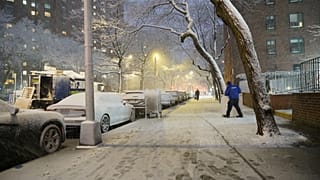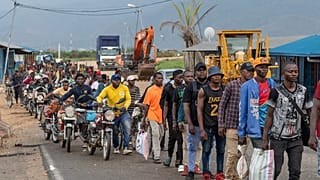USA
The UN human rights office warned Tuesday that the deportation of hundreds of Venezuelan immigrants from the U.S. to El Salvador is “raising huge human rights concerns”.
“Lawyers don’t know where they are,” Liz Throssell, a spokesperson for the OHCHR, said at a news conference in Geneva. “In fact no one knows where they are for certain, and we don’t know the legal basis.”
In March, the U.S. government deported more than 200 Venezuelan immigrants alleged to have ties to the Tren de Aragua gang to El Salvador, paying the Salvadoran government to imprison them.
Since then, they have had no access to lawyers or ability to communicate with their families. Neither the U.S. nor Salvadoran governments have said how the men could eventually regain their freedom.
“Reports indicate that many of the detainees were not informed of the US Government’s intention to deport them to be held in a third country, that many did not have access to a lawyer and that they were effectively unable to challenge the lawfulness of their removal before being flown out of the US,” Throssell said.
Flights carrying immigrants were already in the air when a federal judge issued an order temporarily barring the deportations under an 18th century wartime declaration targeting Venezuelan gang members.
The immigrants were taken to the notorious CECOT facility, the centerpiece of El Salvadoran President Nayib Bukele’s push to pacify his once violence-wracked country through tough police measures and limits on basic rights.
Bukele has agreed to house about 300 immigrants for a year at a cost of $6 million in his country’s prisons.
“The UN Human Rights Office has information from family members and lawyers regarding more than 100 Venezuelans believed to be held in CECOT,” Throssell said.
International human rights organizations on Friday filed a lawsuit with the Inter-American Commission on Human Rights asking that the commission order El Salvador’s government to release the Venezuelans.
The immigrants were removed after Trump’s declaration of the Alien Enemies Act of 1798, which has been used only three times in U.S. history.
The law, invoked during the War of 1812 and World Wars I and II, requires a president to declare the United States is at war, giving him extraordinary powers to detain or remove foreigners who otherwise would have protections under immigration or criminal laws.
It was last used to justify the detention of Japanese-American civilians during World War II.
The Trump administration said that the men deported were members of the Tren de Aragua gang.
Tren de Aragua originated in an infamously lawless prison in the central state of Aragua and accompanied an exodus of millions of Venezuelans, the overwhelming majority of whom were seeking better living conditions after their nation’s economy came undone during the past decade.
Trump seized on the gang during his campaign to paint misleading pictures of communities that he contended were “taken over” by what were actually a handful of lawbreakers.
The Trump administration has not identified the immigrants deported, provided any evidence they are in fact members of Tren de Aragua or that they committed any crimes in the United States.
It also sent two top members of the Salvadoran MS-13 gang to El Salvador who had been arrested in the United States.
“Families we have spoken to have expressed a sense of complete powerlessness in the face of what has happened and their pain at seeing their relatives labelled and handled as violent criminals, even terrorists, without any court judgment as to validity of what is claimed against them," Throssel said.











01:56
Eastern DR Congo situation 'catastrophic', says visiting EU commissioner
01:10
US Supreme Court strikes down Trump global tariffs
02:20
'Everything was removed': Gambians share pain with FGM ban in balance
01:14
UN calls on both authorities in Libya to protect rights of migrants
00:59
Jesse Jackson, civil rights titan and presidential candidate, dies at 84
01:00
Russia marks Navalny grave anniversary amid poison test fallout